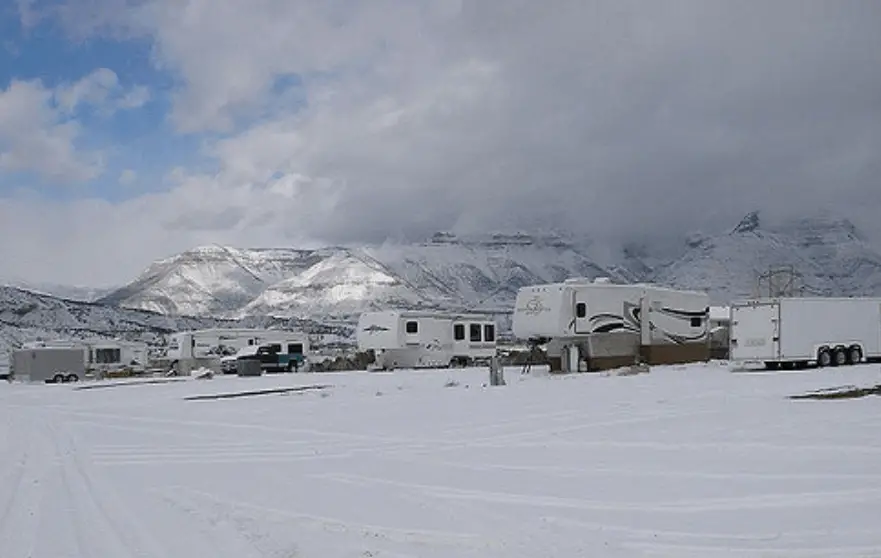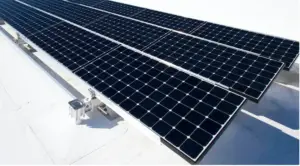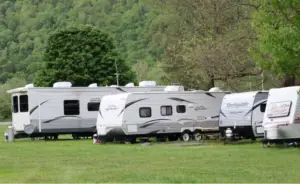Taking care of your rv or motorhome during winter is the most critical thing an rver should do. In fact, the preparation must start much before the winter arrives. In this post, we will see basic points about rv antifreeze.
Getting your rv winterized action item cannot be taken lightly, specially by those who live in snow falling states. A rv can become useless with snow, if it is not protected well. Getting the rv winterized has to be done in steps, following proper procedure is important.
One of the important elements to protect in rv, is the pipping and plumbing system. A temperature below freezing point, can freeze the pipes and break them, which will need replacements. And, believe me its not easy and not cheap as well.
A piping system is less accessible and thus, its replacement or repair is much difficult and therefore, you will end up paying much more.
RV antifreeze is one of the most important accessories that you need to use to protect the whole water based system in your motorhome or travel trailer or fifth wheel. As an rver, many of us have these basic questions about rv antifreeze and in this post, lets explore those.
1. What is rv antifreeze and why you need it
RV antifreeze is a liquid solution that is used to prevent rv plumbing systems from freezing and consequences due to very cold temperatures. The rv water pipes are narrow and thin, with temperature going down during winter, the pipes start to freeze. And then the pipes start to expand resulting in breaking them and water splashes.
For this, one has to winterize the rv in time. A pink solution called as rv antifreeze can be used and pumped into the rv plumbing system to prevent such damage to the water pipe lines.
Remember, a rv pipeline can be low cost but replacing the pipeline can cost you hundred of dollars. Replacing the pipeline system can be tough as the access itself can be tough. Most people start thinking about winterizing much in advance, winterize can be done using various products but rv antifreeze is the way to go. Explore all different options in my other post to keep the pipes from freezing.
2. Difference between rv antifreeze and normal antifreeze
This is an important point every rver should know. Just remember one point, rv antifreeze is a complete different thing when you compare it with normal automobile antifreeze. Automotive antifreeze are toxic and can only be used inside the automobile engine.
For rv, you need the antifreeze for protecting the plumbing systems in your rv. You need to use non toxic antifreeze for this. Rv antifreeze are non toxic and specifically prepared for this. They mostly come in pink color, but you may also get them in blue colors. For a lay man, when you ask them, they would just say i use that pink color liquid stuff. There are multiple compositions for this as discussed below.
3. What are the different type of rv antifreeze and which one to go for
Rv antifreeze can be of 3 different types, each of them can cost around $6-$8 per gallon. Each of them have their own pros and cons. You need to consult a rv professional before using them so that it doesn’t harm the plumbing system badly.
# Propylene or Ethanol Based : This is a non toxic rv antifreeze and is safe for rv plumbing systems. It helps in drying out seals in the plumbing.
# Propylene Glycol based : This is non toxic rv antifreeze that can be used for winterizing the rv pipelines. It helps in increasing the seals inside the faucets and toilet.
# Ethanol based : This is an alcohol based rv antifreeze and thus, it can dry out rubber seals inside faucets and toilets. It can produce smells and the water may taste a little bad. They are also flammable and you need to be cautious while using them. You would find this type of rv antifreeze at stores easily , but you need to take decision based on above points.
4. What exactly rv antifreeze do and how it works
RV antifreeze is basically used to pump into the plumbing system of your motorhome or rv. The whole purpose is to increase the freezing point of the water. The rv antifreeze formulas, if you noticed are basically alcohol based and they help in raising the freezing point of water to much below and thus, even when the temperatures drops much below, the pipes are protected from freezing and hence from breaking.
And, by doing this you will be able to protect the piping and other plumbing systems within the rv. If you live in states like Alaska, then you exactly know what it means during the peak winter times.
Freezing colds can destroy the whole piping inside rv and you wont get a chance to repair it. The most important thing a rver needs to do in such regions, is to protect the rv as much as possible else you wouldn’t be able to get the rv running during the next season.
5. Can using rv antifreeze change the taste of water
People do say that they could make out the taste of water was changed after using the rv antifreeze. Specially, after using the ethanol type rv antifreeze, people see the taste changing. So, does that mean you avoid the antifreeze?
Well, it depends on what kind of rv antifreeze you use. One can use propylene glycol type that may not give the bad taste but it also depends on the process used to manufacture the antifreeze. A glycol type could be prepared from recycled one and that could be a bad thing for you.
So, how do you figure out if its recycled or not. Well, you may try brands that are sold at reputed outlets like Walmart rather than trying local brands found at smaller outlets at cheap rates.
The best thing to do while winterizing and using rv antifreeze is to just drain out every drop out of your piping systems and you wont get that taste of rv antifreeze the next time you drink the water inside rv.
6. Can rv antifreeze go bad
Using rv antifreeze and keeping the unused for next year, is a thing of common for most of us. So, do i simply reuse the last years rv antifreeze? And, does the rv antifreeze has any definite life?
Well, have seen people talking about how they used a very old rv antifreeze and that worked just fine. But, it all depends on whether that pink stuff was kept opened or properly sealed. A common sense here would be, if you keep it properly sealed or never opened it then it should remain intact for 2-5 years.
That’s the normal shelf life a rv antifreeze will have. But, its better to check the label on the container (if there’s one). And, check if the manufacturer has given any expiry date. Many a times we see that the date is missing and that’s why all this confusion.
So, a logical view point here would be to avoid using a opened rv antifreeze for next year and probably go for a new one. If you don’t open it or kept it properly sealed through out the year then probably try using it.
One way that can be tested, is try putting the pink liquid in deep freezer and see if it turns into ice. If it does not and remains a slush then its good and can be used.
Make sure you try this with care and be sure nobody drinks it by mistake. Well, that’s the story on how long the rv antifreeze will last. Do let us know in comments on whats your experience with using old rv antifreeze, i am sure many of you have used previous years rv antifreeze and you were just fine with it.
7. What color is rv antifreeze. Is it pink always?
Many of us recognize it with the color pink. Its mostly pink in color but we do see blue colored one as well. Not sure whats the difference between the two though. Normally the rating for pink is found to be -50F. But, i think on the blue one people do see -100F, and have also seen such number on pink as well. So not quite sure on this. But, yes its mostly pink and slushy.
8. Can you dilute the RV antifreeze
Not sure why would someone want to do this. But, that’s the question that many rvers have. Well, you absolutely should not do it. Why? Its only logical and makes sense not to dilute it.
Why would you want to reduce the strength of the antifreeze. It wouldn’t work the way it was meant to be. Have seen people trying this and getting their pipping systems and other appliances like water pumps getting damaged later in the winter. Thus, its better not to try such things out here and go full strength on the rv antifreeze
9. should i put rv antifreeze in my freshwater tank
Well, this can be done but you need to make sure you drain out everything out properly. A good thing however, that can be done is to bypass putting it in fresh water tank and get out flushed thorough the entire system.
One point why some of the rvers don’t do this is because they feel it may never go out. Even though the rv antifreeze is non toxic, it may still change the taste of water. If you cant get that every drop out of the piping system and fresh water tank, then avoid putting it inside.
10. can you winterize an rv without antifreeze
If the temperature isn’t going below very much then a compressed air method to put out every drop of water from the piping system may work. But, why would you not use it? Does it cost so much? It will be not even more than $30 and how much is your rv? $25,000? $50,000 or more, right? Then why would you simply go without the antifreeze?
One may want to avoid the bad taste water or so, but that shouldn’t be a bigger problem if you manage to get out all the water drops using compress air method. So to conclude, it is possible to winterize without rv antifreeze but its better to go with it as it wouldn’t be bad and also cost is very less.
11. how much rv antifreeze to winterize rv
The winter is about to come and you are all set to get the rv winterized for the harsh season. Using the rv antifreeze is the best way to keep your rv plumbing systems in good conditions, so how much rv antifreeze do you exactly need?
Well, it depends on the size, layout and length of your rv or travel trailer. You get rv’s that are 45 feet in length as well as rv’s that are lesser than 20 feet. A class A motorhome can be more than 45 feet, you also get fifth wheel of that length. Even class C rv tend to be of lengths more than 30 feets.
Bigger the rv, larger will be the pipping and plumbing system and thus, more will be the need of rv antifreeze. Considering an average size of the rv you should be okay with about 2-3 gallons of rv antifreeze to keep the whole plumbing system protected inside the rv.




